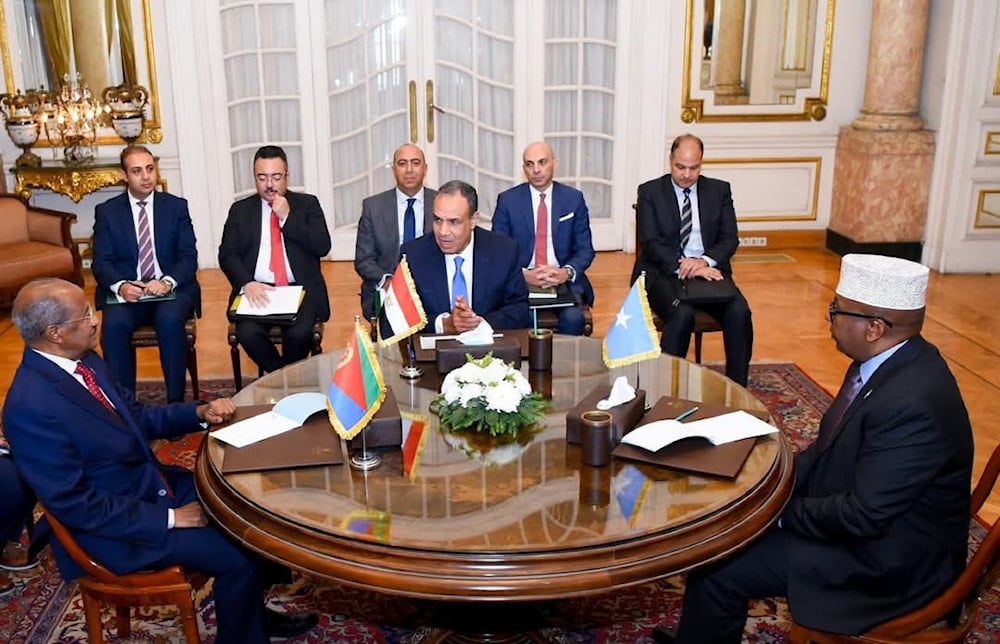Red Sea security is coastal states' duty, say Egypt, Somalia, Eritrea
The trilateral meeting builds on commitments made during the October 2024 summit in Asmara, where the leaders of Egypt, Eritrea, and Somalia jointly rejected unilateral actions threatening regional security.
-

The Egyptian Foreign Minister alongside his Somali and Eritrean counterparts (Foreign Ministry of Egypt)
In a significant trilateral meeting held in Cairo on Saturday, the foreign ministers of Egypt, Somalia, and Eritrea affirmed that the responsibility for maintaining the security of the Red Sea rests solely with its coastal states.
The ministers discussed critical issues, including the current situations in Sudan and Somalia, the stability of the Red Sea region, and broader regional dynamics. They reaffirmed the need for strengthened diplomatic coordination among the three nations to address pressing issues and enhance cooperation.
In a joint statement, the ministers announced the establishment of a trilateral mechanism for regular meetings aimed at bolstering diplomatic ties and addressing mutual concerns.
The First Meeting of the Joint Trilateral Ministerial Committee between Egypt, Somalia, and Eritrea was held in Cairo today. The meeting aimed to enhance regional cooperation and promote security & stability in the Horn of Africa. pic.twitter.com/ipYllLpLCa
— Egypt MFA Spokesperson (@MfaEgypt) January 11, 2025
Support for Somalia's unity and sovereignty
The meeting reviewed progress in supporting Somalia's unity, sovereignty, and institutional rebuilding efforts. The ministers praised ongoing cooperation to bolster Somalia's capacity to combat terrorism and secure its borders. Discussions also explored further steps to help Somalia extend its control over its full territory and build resilient institutions.
Egyptian Foreign Minister Badr Abdel Atty reaffirmed his country's unwavering support for Somalia, stressing the need to enhance Somalia's ability to safeguard its maritime and territorial borders. Eritrean Foreign Minister Osman Saleh echoed these sentiments, emphasizing the importance of a unified approach to addressing shared security challenges in the region.
Read more: Somalia joins UN Security Council after 54 years
Commitment to the Horn of Africa
Egypt and Eritrea also expressed their determination to strengthen joint efforts to promote stability in the Horn of Africa, recognizing the region's strategic importance. They reiterated the need to counter external interference and maintain the sovereignty and territorial integrity of all states in the region.
The ministers reaffirmed that the security of the Red Sea is intrinsically linked to the collective will and responsibility of its coastal states. They called for the exclusion of external powers from influencing the Red Sea's safety and stability.
Read more: West is losing influence in Africa: Eritrean ambassador to Russia
The trilateral meeting builds on commitments made during the October 2024 summit in Asmara, where the leaders of Egypt, Eritrea, and Somalia jointly rejected unilateral actions threatening regional security. At that summit, they agreed to uphold the sovereignty, independence, and territorial integrity of regional states and to counter external meddling in internal affairs.
Heightened Red Sea security concerns
The meeting comes amid increasing regional and international activity in the Red Sea, including the construction of a Russian naval base in Sudan and recent Yemeni operations targeting Israeli-linked ships. Both developments pose significant security challenges to Red Sea states, potentially altering the regional balance of power and threatening freedom of navigation in this critical maritime route.
The proposed Russian naval facility in Port Sudan has raised concerns among regional powers, including Egypt. While some view the base as a step toward enhancing maritime security, others warn it could intensify geopolitical rivalries in the region. Eritrea and Somalia have also emphasized the need for coordinated responses to safeguard the sovereignty of Red Sea states from external influences.
Read more: Sudan commits to building Russian Navy base in Red Sea
Yemeni forces, particularly the Ansar Allah movement, have recently escalated attacks on Israeli and Israeli-linked vessels in the Red Sea in response to Israeli actions in Gaza. US-led aggressions on Yemen have disrupted maritime traffic and posed serious economic challenges for Egypt, which heavily relies on the Suez Canal for foreign currency revenue.
Yemeni operations have led to a decrease in canal traffic, as shipping companies opt for alternative, safer routes. This diversion has caused a notable decline in Suez Canal revenues, compounding Egypt's existing economic difficulties and underscoring the urgent need for regional stability.

 4 Min Read
4 Min Read










